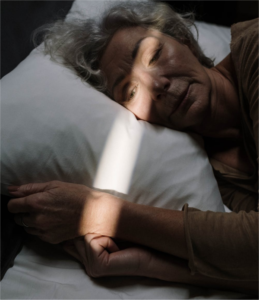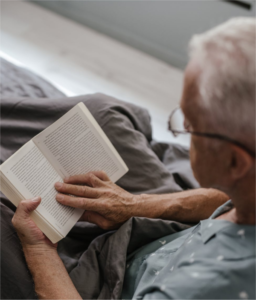How Seniors Can Improve Their Sleep
Sleep is the golden chain that binds health and our bodies together.” – Thomas Dekker
 Sleep is important no matter what age you are, it’s important physically and mentally. But the lack of it can have a different impact on a person who is an older adult. As you age, your normal sleep patterns often change, and you may find you’re not feeling as rested and energetic as you feel you should.
Sleep is important no matter what age you are, it’s important physically and mentally. But the lack of it can have a different impact on a person who is an older adult. As you age, your normal sleep patterns often change, and you may find you’re not feeling as rested and energetic as you feel you should.
Disturbed sleep patterns often take over your night in the form of:
- becoming sleepy earlier
- waking up earlier
- less deep sleep (when you get the best rest)
- RLS or restless leg syndrome
- sleep apnea
- frequent trips to the bathroom
How much sleep is necessary?
Each person requires a different amount of sleep to remain healthy and to feel good…most adults require between 7-9 hours per night. But the best way to decide if you’re getting enough rest is by how you feel in the morning. If you’re waking up and feeling like you need to continue sleeping, you’re not rested, or if you tire too easily during the day, you’re probably not sleeping well at night.
Although this may seem a little thing, these changes in your sleep patterns cause you to lose sleep, and can have an impact on your…
- memory
- your concentration
- your immune system
- can cause depression
- can lead to heart disease, diabetes, breast cancer and weight problems
Tips to improve your sleep…
- The first thing you should do is talk to your doctor and share your concerns. You may be taking medications, such as water pills, and your doctor may be able to adjust them or prescribe something different that will allow for better sleep.
 Turn off your electronic devices and TV about 30 minutes before heading to bed. Not only do they stimulate the brain when it should be winding down, but the blue light they emit affects your ability to go to sleep and stay asleep. A better thing to do before bedtime would be to read a book.
Turn off your electronic devices and TV about 30 minutes before heading to bed. Not only do they stimulate the brain when it should be winding down, but the blue light they emit affects your ability to go to sleep and stay asleep. A better thing to do before bedtime would be to read a book.- If you drink caffeinated beverages, not only can the caffeine disturb your sleep, but it can act as a diuretic, and increase trips to the bathroom. Avoid caffeine for 6 hours before going to bed.
- Increase your physical activity during the day to promote better sleep.
- Get a good dose of sunlight whenever possible. The light helps regulate melatonin, the hormone that helps determine the sleep-wake cycles.
- Keep a sleep schedule that is consistent and your body depends on.
- If you nap during the day, keep it short, and nap early in the afternoon. If you find you have problems waking yourself up from a short nap you may want to set an alarm.
- Do things that are soothing before going to bed, such as taking a bath, meditating, or listening to peaceful music.
- You can help manage your sleep with diet…
- Avoid large or spicy meals, especially close to bedtime.
- If you’re hungry before bed, enjoy a light, low sugar/carbohydrate snack.
- Avoid alcohol and excess liquids before sleep.
- If worrying keeps you awake, keep a pen and paper by your bedside, write down what is keeping you awake, and deal with it in the morning…everything seems worse than it really is at night.
Sleep well…![]()
We are Certified Senior Move Managers recognized by our National Association of Senior Move Managers, NASMM! We are committed to serving our seniors with a high standard of ethics, best business practices and continuing education to help make whatever transition they are going through a Smooth Transition.
Contact us to learn how we can help you and/or your family with senior downsizing and moving anywhere in the Phoenix East Valley area, additionally we can assist if you are moving out of state.
We offer a Free consultation.
We would love to serve you. 480-339-0011

Comments are closed.